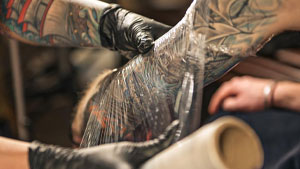After you get a tattoo you do not have to keep the area covered for long periods of time. You do have to keep it covered for at least the first two hours after the procedure. Then you may want to bandage the area for a period of two to three days depending on the peeling and irritation you experience.
Follow these common-sense guidelines and you should heal wonderfully after your tattoo.
Tattoo Aftercare Tips: How Long Should You Covered New Tattoo
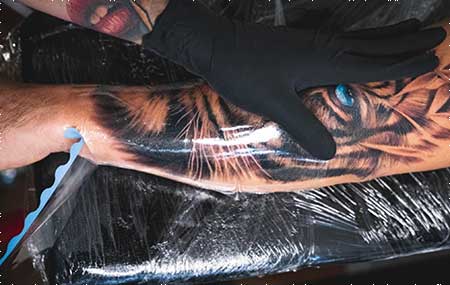
What to do When Keep a New Tattoo Covered?
How you care for your tattoo will determine how quickly it heals, how long it lasts, and to some degree how good it looks. After you have gotten a tattoo there are certain things you must do every day to promote healing, prevent infection, and keep the skin around the new ink from drying and being painful.
- Wear the bandage covering the tattoo for as long as the tattoo artist suggested. If you did an at home stick and poke tattoo then wear a bandage for at least the first four days.
- Wash the area twice a day. You want to gently remove the bandage, pat the tattoo using a soft cloth and a very mild antibacterial cleanser, then pat the tattoo with a soft cloth that has nothing but clean rinse water. DO NOT rub vigorously. DO NOT soak the area.
- Apply a very thin layer of moisturizing ointment on top of the tattoo. Be sure that you buy a moisturizer that is both fragrance and alcohol free. Also check the lotions to make sure they do not have any colored dyes in them that could cause your skin to dry out.
- Bandage the area. After about four days you can stop wearing the bandage over the new tattoo but you should continue with the cleaning and moisturizing as a daily ritual.
- Call you doctor or your tattoo artist if you experience extreme pain, unusual amounts of swelling, bleeding, rash, or allergic reactions. If there is fever or redness go get checked to make sure that an infection has not started.
Once your tattoo is completely healed you will need to wear sunscreen and protectant over it when you are going to be in the sun for extended periods of time.
What to Avoid When Keep a New Tattoo Covered?
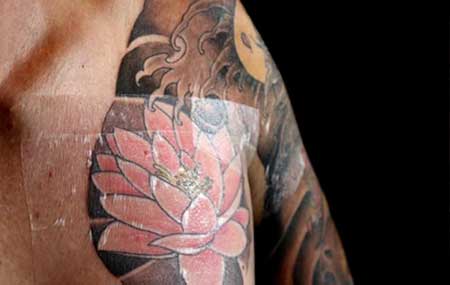
Scratching the area
A tattoo can cause you to itch as it heals. You need to avoid scratching the tattoo because you can break the skin and introduce bacteria that can lead to you having an infection.
Do not pick at it
If a crustiness or scab forms on the tattoo do not pick at it. Allow it to naturally release and fall away from the area.
Wearing tight clothing
Tight clothing can rub against the skin and cause irritation. It can also prevent the skin from breathing and can cause more inflammation and pain, as well as promote redness and swelling.
Immersing the area in water
It is good to keep the area clean, and you are free to shower, but do not immerse the area in water to soak in the tub. Do not go swimming or engage in any water sports, and avoid getting your clothing wet and letting it sit against the skin for long periods of time.
Covering the area with sunscreen
Until your tattoo has completed healed you do not want to slather sunscreen over it. If you are going outside wear protective clothing instead of a layer of sunscreen.
Vaseline and Petroleum Skincare Products
Dermatologists say that Vaseline is a good moisturizer and protectant, but the 100% petroleum product can cause the ink of the tattoo to fade.
Tattoo Aftercare Products
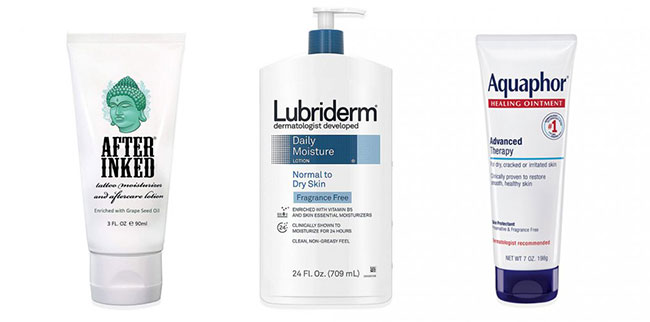
Some of the most commonly used tattoo aftercare skin products include:
- Fragrance free antibacterial soaps
- A&D Ointment
Water
It is imperative that you consume between 8 and 10 glasses of water each day. You must stay properly hydrated so your skin will stay hydrated, and you will experience fewer complications from the dyes and the trauma of the tattoo. If you are not properly hydrated your skin is likely to pucker or wrinkle and this could distort the image you have just gotten.
A Health Diet
A healthy diet that restricts sodium intake will promote the hydration of your skin and help you avoid some of the painful symptoms of dehydration. Sodium in your food and drink can cause you to swell and retain fluids.
Eat plenty of fresh fruits and vegetables and a well-balanced diet. These healthy foods will encourage healing and reduce the amount of time that you experience dryness, redness, swelling, and other distasteful side-effects of getting a tattoo.
Coconut Oil and Tattoo Aftercare
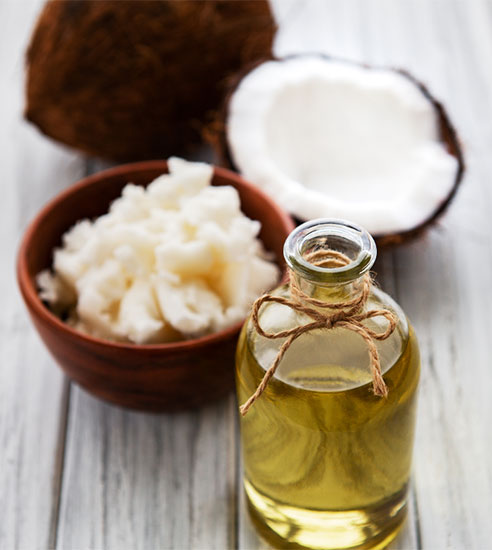
You may be surprised to learn that one of the beneficial items you can use for aftercare on a tattoo is coconut oil. This oil is natural and is known to help boost skin collagen levels. The oil also helps to protect against bacterial infections because it contains very high levels of lauric acid.
It works as a moisturizer that helps to keep the skin soft and supple. It is capable of soothing itching and inflammatory skin conditions like eczema. The oil has properties that allow it to reduce the occurrence of oxidative stress and it boosts tissue growth so wounds heal more rapidly.
Coconut oil is hypoallergenic so you are not likely to have an allergic reaction to it. It also smells amazing.
Dry healing
This healing practice has the recently tattooed person keep the area clean, protect it from the sun, but skip the moisturizing and ointment applications.
During dry healing, it is imperative that you avoid exposure to sunlight on the newly tattooed area. Wear protective clothing if you have to be in the sun.
This practice does allow you to avoid the possibility of some allergic reactions to the lotions and ointments used after getting a tattoo.
The biggest drawback of dry healing is the itching and pain are intensified. People report a higher level of itching, and they have a higher incidence of dry skin that is irritating and uncomfortable.
Side Effects and Complications of Tattoos
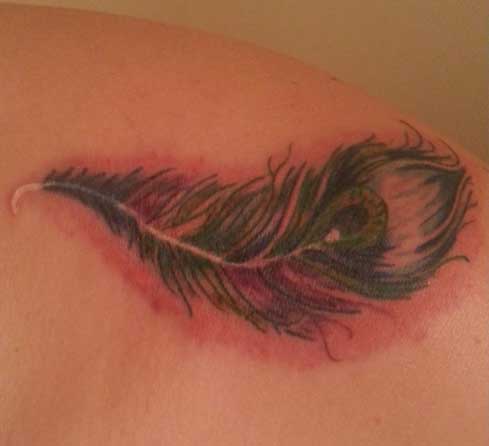
Infection
Infections are the number one major problem that can be brought on by a tattoo. Skin infections may cause redness and irritation, pain, or fever in the area. Pustules may be present as well. You need to seek medical advice on how to treat a skin infection.
Allergic reaction
People can be allergic to the dyes used in the creation of a tattoo. Most people who have reactions will react to red, green, blue, or yellow dyes. The reactions can range in symptoms from a red itchy rash with or without inflammation. The rashes caused by allergic reactions to tattoo dyes can occur shortly after the tattoo is completed and the rash can appear for years after the tattoo is completed.
Granulomas
These are areas of inflammation that form around the ink of the tattoo.
Scarring
Tattoos can cause different types of skin scarring. Such as Keloids which are raised areas of scar tissue. They are not usually painful but people find them to be irritating and very unattractive.
Serious bloodborne diseases
You can contract serious blood-borne diseases if the equipment used in your tattoo is not properly sterilized and disinfected. These diseases can even become life-threatening. The most common bloodborne diseases spread by contaminated equipment are:
- Staphylococcus Aureus that is methicillin resistant
- Hepatitis B
- Hepatitis C
Conclusion
Once you have the tattoo and the initial healing has completed you still need to be mindful of your ink and take care of it. With the proper care and attention, you should enjoy the beauty of your tattoo for many years.
Be sure that you
- Drink plenty of water so your skin does not dry out and become dull and flaky.
- Use sunscreen, especially on sensitive areas like your tattoo every time you leave the house. Sunscreen should be a daily regimen you use every day of the year.
- Moisturize your skin to keep it soft and supple and prevent drying.
- Maintain your weight because when you gain weight your skin stretches and your tattoo stretches. When you lose weight, the tattoo will not look the same.
The main thing for you to do is take care of yourself. Watch what you eat, exercise, protect yourself from the harmful rays of the sun, and simply be kind to your skin.

